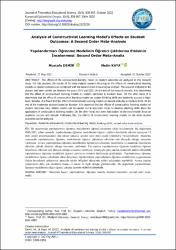Analysis of constructivist learning model’s effects on student outcomes: A second order meta-analysis
Künye
Demir, M. & Kaya, M. (2022). Analysis of Constructivist Learning Model’s Effects on Student Outcomes: A Second Order Meta-Analysis . Journal of Theoretical Educational Science , 15 (4) , 938-957 . DOI: 10.30831/akukeg.1122136Özet
The effects of the constructivist-learning model on student outcomes are analyzed in this research
study. For this purpose, the results of 19 meta-analysis research focusing on the effects of constructivist learning
models on student outcomes are combined with the second-order meta-analysis method. The research included in the
process had been carried out between the years 2015 and 2021. At the end of the research process, it is determined
that the effect of constructivist learning models on student outcomes is medium level. On the other hand, it is
determined that the effect of constructivist learning models on student thinking skills and academic success is highlevel. Besides, it is found that the effect of constructivist learning models on student attitudes is medium level. At the
end of the moderator analysis based on location, it is observed that the effects of constructivist learning models on
student outcomes vary. Atelier studies can be carried out in education zones to develop teaching skills about the
application of constructivist learning models. On the other hand, it is seen that studies on the issue mostly focus on
academic success and attitude. Following this, the effects of constructivist learning models on the other student
outcomes can be analyzed. Bu araştırmada yapılandırmacı öğrenme modellerinin öğrenci çıktılarına etkisi incelenmiştir. Bu doğrultuda
2015-2021 yılları arasında, yapılandırmacı öğrenme modellerinin öğrenci çıktıları üzerindeki etkisini inceleyen 19
meta analiz araştırmasından elde edilen sonuçlar second order meta analiz yöntemiyle birleştirilmiştir. Araştırma
sonucunda yapılandırmacı öğrenme modellerinin öğrenci çıktılarına etkisinin orta düzeyde olduğu sonucuna
varılmıştır. Ayrıca yapılandırmacı öğrenme modellerinin öğrencilerin düşünme becerilerine ve akademik başarılarına
etkisinin yüksek düzeyde olduğu sonucuna erişilmiştir. Öte yandan yapılandırmacı öğrenme modellerin öğrenci
tutumlarına etkisinin orta düzeyde olduğu sonucuna varılmıştır. Lokasyona göre yapılan moderatör analizi sonucunda
yapılandırmacı öğrenme modellerin öğrenci çıktılarına etkisinin farklılaştığı görülmüştür. Yapılandırmacı öğrenme
modellerinin öğrenci çıktılarına etkisi dolayısıyla öğretmenlerin yapılandırmacı öğrenme modellerinin uygulamasına
ilişkin becerilerini geliştirmek amacıyla eğitim bölgeleri düzeyinde atölye çalışmaları yapılabilir. Ayrıca yapılan
çalışmaların daha çok akademik başarı ve tutum ile ilgili olduğu görülmektedir. Bu doğrultuda yapılandırmacı
öğrenme modellerinin diğer öğrenci çıktıları üzerine etkileri incelenebilir.
Kaynak
Kuramsal Eğitimbilim DergisiCilt
15Sayı
4Bağlantı
https://dergipark.org.tr/tr/pub/akukeg/issue/72732/1122136https://hdl.handle.net/11630/11052
Koleksiyonlar
- Cilt 15 : Sayı 4 [10]



















